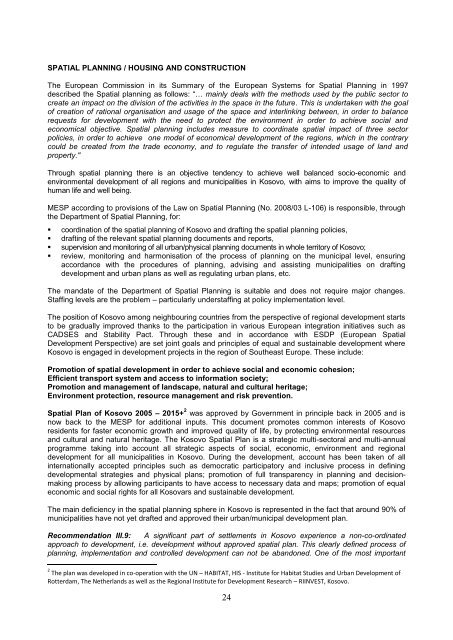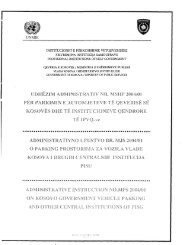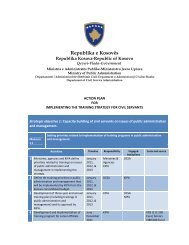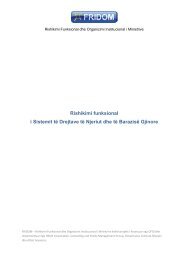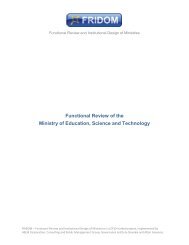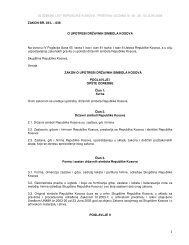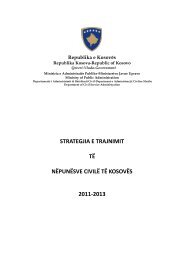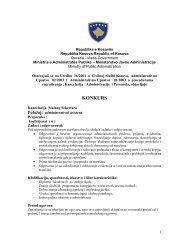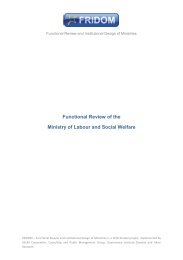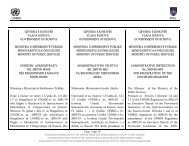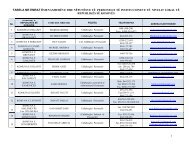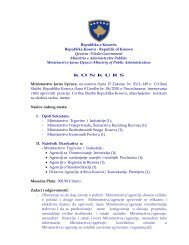Functional Review of the Ministry of Environment and Spatial Planning
Functional Review of the Ministry of Environment and Spatial Planning
Functional Review of the Ministry of Environment and Spatial Planning
Create successful ePaper yourself
Turn your PDF publications into a flip-book with our unique Google optimized e-Paper software.
SPATIAL PLANNING / HOUSING AND CONSTRUCTION<br />
The European Commission in its Summary <strong>of</strong> <strong>the</strong> European Systems for <strong>Spatial</strong> <strong>Planning</strong> in 1997<br />
described <strong>the</strong> <strong>Spatial</strong> planning as follows: “… mainly deals with <strong>the</strong> methods used by <strong>the</strong> public sector to<br />
create an impact on <strong>the</strong> division <strong>of</strong> <strong>the</strong> activities in <strong>the</strong> space in <strong>the</strong> future. This is undertaken with <strong>the</strong> goal<br />
<strong>of</strong> creation <strong>of</strong> rational organisation <strong>and</strong> usage <strong>of</strong> <strong>the</strong> space <strong>and</strong> interlinking between, in order to balance<br />
requests for development with <strong>the</strong> need to protect <strong>the</strong> environment in order to achieve social <strong>and</strong><br />
economical objective. <strong>Spatial</strong> planning includes measure to coordinate spatial impact <strong>of</strong> three sector<br />
policies, in order to achieve one model <strong>of</strong> economical development <strong>of</strong> <strong>the</strong> regions, which in <strong>the</strong> contrary<br />
could be created from <strong>the</strong> trade economy, <strong>and</strong> to regulate <strong>the</strong> transfer <strong>of</strong> intended usage <strong>of</strong> l<strong>and</strong> <strong>and</strong><br />
property."<br />
Through spatial planning <strong>the</strong>re is an objective tendency to achieve well balanced socio-economic <strong>and</strong><br />
environmental development <strong>of</strong> all regions <strong>and</strong> municipalities in Kosovo, with aims to improve <strong>the</strong> quality <strong>of</strong><br />
human life <strong>and</strong> well being.<br />
MESP according to provisions <strong>of</strong> <strong>the</strong> Law on <strong>Spatial</strong> <strong>Planning</strong> (No. 2008/03 L-106) is responsible, through<br />
<strong>the</strong> Department <strong>of</strong> <strong>Spatial</strong> <strong>Planning</strong>, for:<br />
coordination <strong>of</strong> <strong>the</strong> spatial planning <strong>of</strong> Kosovo <strong>and</strong> drafting <strong>the</strong> spatial planning policies,<br />
drafting <strong>of</strong> <strong>the</strong> relevant spatial planning documents <strong>and</strong> reports,<br />
supervision <strong>and</strong> monitoring <strong>of</strong> all urban/physical planning documents in whole territory <strong>of</strong> Kosovo;<br />
review, monitoring <strong>and</strong> harmonisation <strong>of</strong> <strong>the</strong> process <strong>of</strong> planning on <strong>the</strong> municipal level, ensuring<br />
accordance with <strong>the</strong> procedures <strong>of</strong> planning, advising <strong>and</strong> assisting municipalities on drafting<br />
development <strong>and</strong> urban plans as well as regulating urban plans, etc.<br />
The m<strong>and</strong>ate <strong>of</strong> <strong>the</strong> Department <strong>of</strong> <strong>Spatial</strong> <strong>Planning</strong> is suitable <strong>and</strong> does not require major changes.<br />
Staffing levels are <strong>the</strong> problem – particularly understaffing at policy implementation level.<br />
The position <strong>of</strong> Kosovo among neighbouring countries from <strong>the</strong> perspective <strong>of</strong> regional development starts<br />
to be gradually improved thanks to <strong>the</strong> participation in various European integration initiatives such as<br />
CADSES <strong>and</strong> Stability Pact. Through <strong>the</strong>se <strong>and</strong> in accordance with ESDP (European <strong>Spatial</strong><br />
Development Perspective) are set joint goals <strong>and</strong> principles <strong>of</strong> equal <strong>and</strong> sustainable development where<br />
Kosovo is engaged in development projects in <strong>the</strong> region <strong>of</strong> Sou<strong>the</strong>ast Europe. These include:<br />
Promotion <strong>of</strong> spatial development in order to achieve social <strong>and</strong> economic cohesion;<br />
Efficient transport system <strong>and</strong> access to information society;<br />
Promotion <strong>and</strong> management <strong>of</strong> l<strong>and</strong>scape, natural <strong>and</strong> cultural heritage;<br />
<strong>Environment</strong> protection, resource management <strong>and</strong> risk prevention.<br />
<strong>Spatial</strong> Plan <strong>of</strong> Kosovo 2005 – 2015+ 2 was approved by Government in principle back in 2005 <strong>and</strong> is<br />
now back to <strong>the</strong> MESP for additional inputs. This document promotes common interests <strong>of</strong> Kosovo<br />
residents for faster economic growth <strong>and</strong> improved quality <strong>of</strong> life, by protecting environmental resources<br />
<strong>and</strong> cultural <strong>and</strong> natural heritage. The Kosovo <strong>Spatial</strong> Plan is a strategic multi-sectoral <strong>and</strong> multi-annual<br />
programme taking into account all strategic aspects <strong>of</strong> social, economic, environment <strong>and</strong> regional<br />
development for all municipalities in Kosovo. During <strong>the</strong> development, account has been taken <strong>of</strong> all<br />
internationally accepted principles such as democratic participatory <strong>and</strong> inclusive process in defining<br />
developmental strategies <strong>and</strong> physical plans; promotion <strong>of</strong> full transparency in planning <strong>and</strong> decisionmaking<br />
process by allowing participants to have access to necessary data <strong>and</strong> maps; promotion <strong>of</strong> equal<br />
economic <strong>and</strong> social rights for all Kosovars <strong>and</strong> sustainable development.<br />
The main deficiency in <strong>the</strong> spatial planning sphere in Kosovo is represented in <strong>the</strong> fact that around 90% <strong>of</strong><br />
municipalities have not yet drafted <strong>and</strong> approved <strong>the</strong>ir urban/municipal development plan.<br />
Recommendation III.9: A significant part <strong>of</strong> settlements in Kosovo experience a non-co-ordinated<br />
approach to development, i.e. development without approved spatial plan. This clearly defined process <strong>of</strong><br />
planning, implementation <strong>and</strong> controlled development can not be ab<strong>and</strong>oned. One <strong>of</strong> <strong>the</strong> most important<br />
2 The plan was developed in co-operation with <strong>the</strong> UN – HABITAT, HIS - Institute for Habitat Studies <strong>and</strong> Urban Development <strong>of</strong><br />
Rotterdam, The Ne<strong>the</strong>rl<strong>and</strong>s as well as <strong>the</strong> Regional Institute for Development Research – RIINVEST, Kosovo.<br />
24


